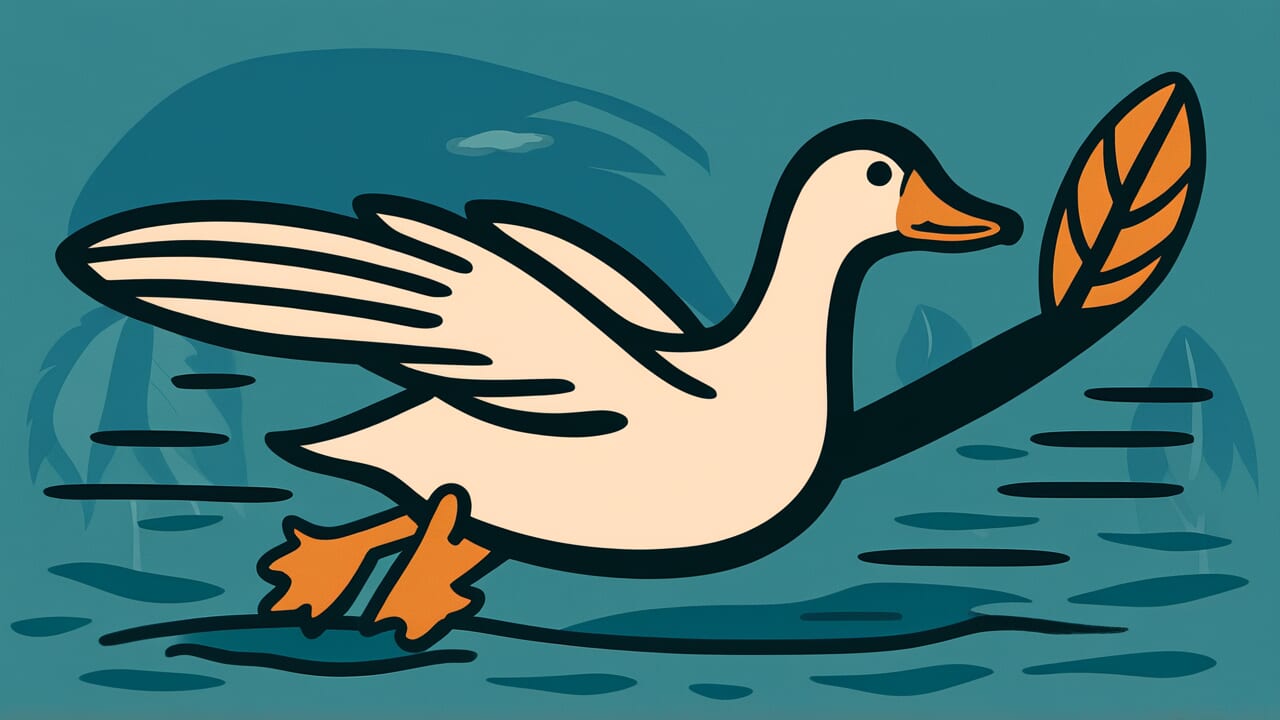How to Read “Life is lighter than a swan feather”
Inochi wa kōmō yori karushi
Meaning of “Life is lighter than a swan feather”
This proverb means that human life is lighter than a bird’s feather and insignificant. It doesn’t encourage treating life carelessly. Instead, it expresses the resolve to sacrifice one’s life for a greater cause or belief.
The samurai world mainly used this phrase. It expressed the mindset that one’s own life was as light as a feather when serving one’s lord or fighting for justice.
Warriors also used it when heading to battle or facing difficult missions. It showed their determination and readiness.
Modern society doesn’t promote such extreme self-sacrifice. However, people still recognize this phrase in historical contexts and period dramas. It helps us understand samurai values.
Today, we view it as a historical expression. It captures the feelings of people willing to risk their lives for something they believe in.
Origin and Etymology
This proverb likely comes from the Chinese historical text “Records of the Grand Historian.” The most accepted theory traces it to a letter called “Letter to Ren An” written by Sima Qian.
The original passage states: “All men must die, but death can be heavier than Mount Tai or lighter than a swan feather.”
Kōmō refers to the feathers of a kō, a large water bird. Bird feathers are so light they dance in the wind. You can barely feel their weight in your hand. Ancient China used this lightness as a symbol of worthlessness.
Sima Qian himself faced a humiliating punishment called palace castration. Despite this disgrace, he chose to keep living. He wanted to complete his mission of recording history for future generations.
For him, dying meaninglessly was as light and worthless as a swan feather. Only a meaningful death carried the weight of Mount Tai.
This expression came to Japan along with Chinese classics. It connected with bushido philosophy and spread throughout samurai culture.
However, Japan shortened the phrase. The part about Mount Tai was dropped. “Life is lighter than a swan feather” became the standard form, emphasizing the lightness of life.
Usage Examples
- Warring States generals believed life is lighter than a swan feather and considered it an honor to die for their lord
- Period dramas show samurai declaring life is lighter than a swan feather, which accurately reflects the values of that era
Universal Wisdom
“Life is lighter than a swan feather” reveals a profound truth. It shows that something more important than life itself can exist for humans. This isn’t just glorifying self-sacrifice.
It tells us that humans are beings who seek meaning and value.
Biological survival alone isn’t life’s only purpose. Throughout history, people have risked their lives for abstract values. Honor, justice, love, and beliefs have all inspired such sacrifice.
Why does this happen? Because humans don’t just live. We question how to live.
This proverb has been passed down for generations because it contains deep insight about human dignity. The idea of choosing meaningful death over meaningless survival teaches something important.
Paradoxically, it shows how crucial giving meaning to life really is.
We don’t need to adopt such extreme values today. However, one essential truth remains unchanged. Humans are beings who live for something.
Finding that “something” enriches our lives.
The question isn’t about life itself. It’s about how we use that life. Our ancestors faced this question seriously. They tried to find their own answers.
That attitude represents the universal wisdom contained in this proverb.
When AI Hears This
In information theory, the same data shows dramatically different information content depending on your measurement unit. Consider one human death. From an individual perspective, that person’s memories, relationships, and future possibilities all vanish.
The information loss is enormous. The brain alone contains about 100 trillion synaptic connections. A lifetime of experiential data equals an estimated 2.5 petabytes. That’s equivalent to several thousand libraries.
But change the reference frame to a nation, and the calculation transforms completely. In a country of 100 million people, one person represents 0.000001 percent. Statistically, this falls within the margin of error.
It gets processed as noise.
Scale up to the universe, and even 7 billion humans become negligible. Compared to the 10 to the 80th power atoms in the observable universe, we’re microscopically small.
What’s fascinating is this: the physical reality hasn’t changed at all. Only the “information resolution” chosen by the observer changes. Yet the same life’s value fluctuates from 10 to the 0th power to 10 to the negative 80th power.
This resembles the observer effect in quantum mechanics. The measurement device determines the result. In this case, the device is our value judgment standard.
This proverb doesn’t show absolute lightness of weight. It reveals something more dangerous. It shows how changing reference frames can make anything seem light.
The choice of which resolution to view the world through is itself an extremely political act.
Lessons for Today
This proverb teaches modern people about the importance of asking “what do I live for?” It doesn’t encourage treating life lightly. Instead, it shows how crucial having values that give your life meaning really is.
In modern society, daily busyness makes us lose sight of what truly matters. Work, relationships, and social status demand our attention. Haven’t you ever paused and wondered, “What am I living for?”
This proverb, though extreme in form, teaches the significance of having clear beliefs and cherished values. It doesn’t mean having resolve to risk your life. It means having core values that anchor your life.
What truly matters to you? Is it time with family, creative activities, contributing to society, or personal growth? Finding that answer becomes the first step toward a fulfilling life.
What we can learn from our ancestors’ extreme values isn’t about living halfway. It’s about the dignity of walking seriously down the path you’ve chosen.



Comments